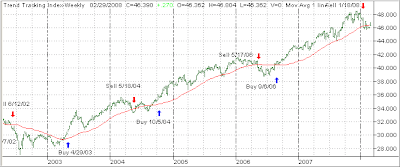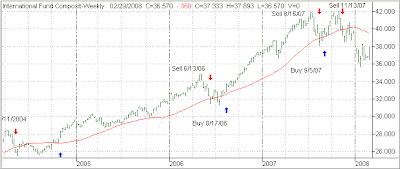 Yesterday’s rally clearly was a follow through from Friday as Wall Street embraced S & P’s affirmation of the AAA rating of bond insurer MBIA—at least for the time being. The main concern has been that any downgrade would force banks and other financial institutions to write off billions of dollars in assets. That means that motivation is high to come up with any plan, now matter how ridiculous it may seem, to postpone the inevitable.
Yesterday’s rally clearly was a follow through from Friday as Wall Street embraced S & P’s affirmation of the AAA rating of bond insurer MBIA—at least for the time being. The main concern has been that any downgrade would force banks and other financial institutions to write off billions of dollars in assets. That means that motivation is high to come up with any plan, now matter how ridiculous it may seem, to postpone the inevitable.
Minyanville’s Peter had this to say to help you understand the issue at hand:
A hurricane comes through your town and levels your house. A few weeks later, you receive a letter from your insurance company telling you that unless you buy some of its stock, it won’t be able to pay your insurance claim. What do you do?
As far fetched as this question may feel, this is, in principle, what’s behind the bailout of the monoline insurance companies. Unless their biggest CDS counterparties step up with more capital, the insurance companies won’t be able to make good on their CDS and the banks will be forced to take write-downs.
How this all plays out remains to be seen, but I would suggest that until additional capital comes into the financial services system from organizations other than other financial services companies, I am afraid that all that is happening is the further leveraging of an already leveraged and highly interdependent financial system.
Now there are those who suggest that creating a “good bank/bad bank” out of the insurance companies will create the opportunity for the incremental outside capital that I suggest is so much in need. And in general I would agree. Adding capital to the “good” municipal business would put that business on more solid footing. But what about the “bad” CDO business?
A review of history suggests that there was really no such thing as a good bank/bad bank strategy – only a good bank/dead bank strategy. For one to live, the other had to die. And to be clear, looking back in time, no matter how the good and bad eggs were unscrambled, the banks’ equity holders (and some holding company lenders) ultimately lost it all.
So until losses are taken, I continue to believe there is a day of reckoning to come for the monoline insurance companies. And, more sadly, I sense the same day of reckoning for those multinational banks who are stepping up to help. For rather than spreading risk beyond the financial system, it appears that every bailout effort seeks to concentrate it more and more onto the balance sheets of world’s largest banks.
And, while I truly wish it weren’t the case, because of the financial system’s interdependence, we continue to postpone the inevitable.
On a more lighthearted note, I got a kick out of a posting at Calculated Risk, which qualifies as the joke of the day. It’s called “Rob now, HOPE later” and is in reference to many home owners getting fed up with their ARM mortgages:
A robber in a ski mask blamed the bank for what he was about to do, The Associated Press reported Feb. 22.
“You took my house, now I’m going to take your money!” the assailant hollered. Talk about a reverse mortgage!
The FBI plans to review the bank’s foreclosure records for clues.
The suspect is presumed to be ARM’ed and dangerous.
 I read this excerpt from the Economist (sorry no link available), which said:
I read this excerpt from the Economist (sorry no link available), which said:





